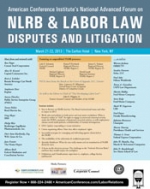Expert Article by Alexander Kipp
Late last year, in Holmes v. Crawford Machine, Inc., Slip Opinion No. 2012-Ohio-5380, the Ohio Supreme Court held that R.C. 4123.512(F) entitles a successful workers’ compensation claimant to recovery all attorney fees, up to the $4,200 statutory maximum, and all costs, rather than apportioned amounts, when a trial court approves only one of the claimant’s multiple claimed medical conditions. In other words, as long as the trial court approves one claimed condition, R.C. 4123.512(F) entitles a claimant to also recover attorney fees and costs related to specifically disallowed conditions. The Court’s ruling resolved a conflict of decisions between the Third and Tenth District Courts of Appeals.
The case involved a workers’ compensation claim filed by Jeff Holmes for injuries to his hand, arm, shoulder, and back that he alleged were caused when he suffered an electric shock while working for Crawford Machine, Inc. Holmes’s claim was ultimately allowed administratively for: left-shoulder strain; electrical shock; low back strain; left-rotator-cuff tear; left-posterior-shoulder dislocation; and abrasion of right fifth finger. Crawford Machine appealed the administrative order to the Crawford County Court of Common Pleas. Holmes petitioned the court for approval of all of his allowed conditions.
Following a jury trial, the court ruled that Holmes was entitled to participate in the Ohio Workers’ Compensation system for the condition of “abrasion right fifth finger” but was not entitled to participate for any of the other conditions that had been administratively allowed. Holmes then petitioned the court for recovery from Crawford Machine of the legal fees and costs he incurred during the appeal process. Crawford Machine argued that Holmes was not entitled to reimbursement of his attorney fees and costs because he had not incurred any attorney fees or costs in relation to his fifth-finger-abrasion condition. The trial court granted Holmes’s motion and ordered Crawford Machine to pay Holmes $4,200 in attorney fees and $7,551.23 in costs.
Crawford Machine appealed from the judgment granting attorney fees and costs, and Holmes appealed from the judgment allowing one, but not all, of his claimed conditions. The Third District Court of Appeals upheld the judgment allowing only one of Holmes’s claimed conditions, and reversed the judgment awarding attorney fees and costs. The Third District certified that its ruling regarding attorney fees and costs was in conflict with a Tenth District Court of Appeals decision on the same legal issue. The Ohio Supreme Court agreed to review the case to resolve the conflict.
Writing for the majority, Justice McGee Brown wrote, “The plain language of R.C. 4123.512(F) requires a trial judge to order reimbursement to a claimant for costs, including attorney fees up to $4,200, if the claimant’s right to participate in the fund is established or upheld on appeal. In this case, Holmes was adjudicated to be entitled to participate in the fund for a fifth-finger abrasion. Therefore, pursuant to R.C. 4123.512(F), the trial court was required to reimburse him for his costs, including attorney fees, associated with his appeal. Since R.C. 4123.512(F) does not require apportionment of these costs based on the outcome of Holmes’s particular conditions, the trial court did not abuse its discretion when it made no such division of costs”… Therefore, once a claimant’s right to participate in the workers’ compensation fund has been established, a trial court does not abuse its discretion under R.C. 4123.512(F) by awarding the claimant reimbursement for costs related to the conditions for which the trier of fact determined the claimant was ineligible to participate in the fund.”
This case should caution employers to choose wisely when it comes to appealing and contesting workers’ compensation claims beyond the administrative levels. As Crawford Machine found out, when multiple conditions are at issue, it may be wise to forego challenging minor cuts, scrapes, and bruises, rather than end up paying nearly $12,000 for a pinky-finger abrasion that was treated with a Band-Aid.
